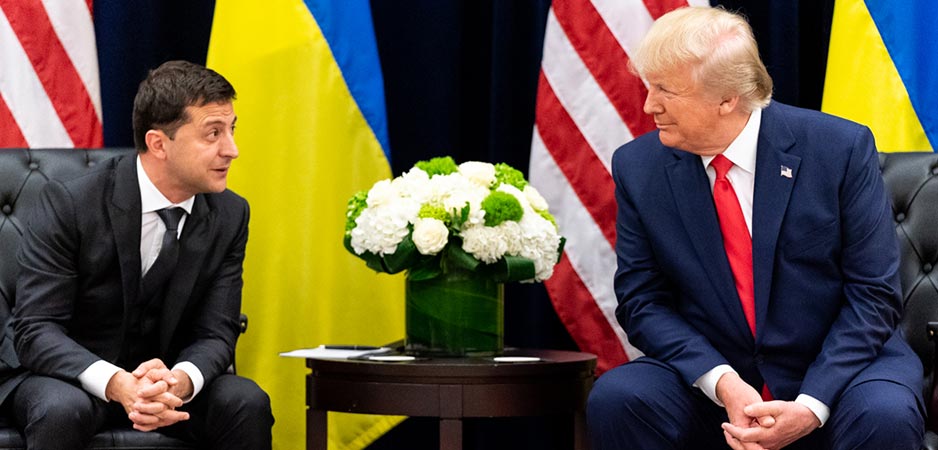Reacting to the latest scandal, which seems to have convinced some hitherto hesitant members of Congress to launch impeachment proceedings against US President Donald Trump, the White House chose to publish its account of what Democrats have implied as an incriminating telephone conversation. Trump countered the Democrats’ complaint by claiming that there is no evidence of a quid quo pro. There is, however, in this reported exchange between two presidents plenty of evidence of the hyperreal nature of modern geopolitics, especially as practiced by President Trump.
The released “transcript” (in fact, a memo, not a verbatim account) is something of an embarrassing if not directly incriminating read. Ukrainian President Volodymyr Zelensky reveals, in his sycophantic fawning over Trump’s personal success story, what politics is like when practiced by two former TV celebrities with no previous experience of politics. Zelensky does have a slight advantage over Trump, having played a fictional Ukrainian president on TV before becoming one. That may have provided him with more appropriate rhetorical training and it may protect him against future revolts demanding his impeachment.
Even so, his rhetoric reveals more about the world of political hyperreality than it does about politics, unless the two have become identical, which many of us have suspected for some time (pre-dating Trump, who cannot be blamed for it since he has simply made the hyperreality of politics more visible).
Here is a passage early in the reported conversation in which Zelensky defines the relationship between the two men, who, it should be noted, had never previously met: “I just wanted to assure you once again that you have nobody but friends around us. I will make sure that I surround myself with the best and most experienced people. I also wanted to tell you that we are friends. We are great friends and you Mr. President have friends in our country so we can continue our strategic partnership.”
Here is today’s 3D definition:
Friends:
1) The name people give to other human beings whom they may not like but who have the power to help them in some way
2) The title of a popular television show from the 1990s about young people who share an apartment
3) The status of anyone with a Facebook account
Contextual Note
The news media are clearly hyped up about an issue that could lead to months of high drama featuring the always exciting title: “the impeachment process.” And it won’t be just any impeachment. Unlike lame duck Bill Clinton’s impeachment, this one concerns a hyper-inflated ego preparing for a bruising reelection campaign.
For the moment, the drama is focused on the question of whether the discovery of the latest in the pattern of Trump’s criminal actions can actually be identified as a crime rather than hyperreal politics as usual. ABC News reports that while Trump may be right that nothing in the transcript indicates an offer of exchange of services, the reporters do call it an “implicit quid pro quo.” In the coming days and weeks, we will see whether there are ways of turning the implicit into the explicit. Trump maintains that it’s just about being nice and developing friendly relations with another leader who believes in friendship. But what friendship?
The notion of friendship Zelensky seems to be referring to when he says “nobody but friends around us” clearly means something closer to people who will do their bidding and not complain than, for example, people they know well and appreciate for their empathy and personal qualities. When he promises to “make sure” that he will be surrounded by the “best and most experienced,” he appears to mean the most amenable to their mutual interests. And when he insists on telling Trump “that we are friends … great friends,” though the two had never previously met, he clearly means they are now in a position to do each other favors. As for the “friends [of Trump] in our country,” he can only mean people who cheer Trump’s politics.
Zelensky delivers a few other hints about what friendship means when he tells Trump that the last time he was in New York, he “stayed at the Trump Tower.” It’s all about two things: doing profitable business and belonging to the same elite group.
Historical Note
Aristotle was the first Western thinker to philosophize in-depth about what friendship meant. He had much to say about the notion of friendship in Book 8 of his work, Nicomachean Ethics.
The philosopher divided friendship into three basic categories: friendship of utility, which he associated with mature adults, who have an interest in associating; friendship of pleasure or enjoyment, which he associated with young people sharing pleasurable activities, such as sport and the friendship of goodness, which depends on a commitment that goes beyond personal utility and pleasure and includes a sincere, complex and long-term appreciation of the friend’s qualities. He considered the first two accidental because they do not exist outside of the external circumstances that defined the specific acts or events of sharing, exchanging or collaborating between two people who become friendly.
The third form of friendship, stressing the notion of merit and moral compass, nevertheless englobes the other two, since good friends tend to be both useful to one another and pleasant to be with. Aristotle adds another important consideration: True friendship “seems to lie in loving rather than being loved.”
Aristotle would undoubtedly have considered Trump, an absolute narcissist, to be incapable of friendship at any level, even at the level of utility. Not only does he appear to be incapable of loving anyone other than himself — as his constant self-congratulation reveals — but he also expects others to love him as much as he loves himself.
Speaking to his “friend,” Zelensky, apart from congratulating the newly-elected president on his unexpected victory, Trump shamelessly claims that as president of the US, he has achieved the greatest success in the history of humanity, and in every domain that counts (mainly the size of the military and stock market, the only ones that do count for him, though he does throw the number of people with jobs into the tally).
For hyperreal actors like Trump and Zelensky, Aristotle should have divided his first category — utilitarian friendship — into two sub-categories: friends who, as the French say, are willing but not committed to “sending the elevator back” (renvoyer l’ascensceur) and quid pro friends. Elevator friends represent what Aristotle had in mind when referring to utility. It refers to people who get to know one another and then discover opportunities to be helpful with favors. But such favors do not require an exchange, they simply open the door to a favor in return. Trump, whose ethics are summed up in the “art of the deal,” knows no other form of friendship than quid pro quo.
In other words, in today’s politics and media hyperreality, the idea of friendship has lost all meaning. That is why we can all be friends on Facebook in a hyperreal space where even quid pro quos are virtual and where low-level narcissism — not as quite dangerous for humanity as Trump’s hyperreal narcissism — becomes the foundation of our relationships.
*[In the age of Oscar Wilde and Mark Twain, another American wit, the journalist Ambrose Bierce, produced a series of satirical definitions of commonly used terms, throwing light on their hidden meanings in real discourse. Bierce eventually collected and published them as a book, The Devil’s Dictionary, in 1911. We have shamelessly appropriated his title in the interest of continuing his wholesome pedagogical effort to enlighten generations of readers of the news.]
The views expressed in this article are the author’s own and do not necessarily reflect Fair Observer’s editorial policy.
Support Fair Observer
We rely on your support for our independence, diversity and quality.
For more than 10 years, Fair Observer has been free, fair and independent. No billionaire owns us, no advertisers control us. We are a reader-supported nonprofit. Unlike many other publications, we keep our content free for readers regardless of where they live or whether they can afford to pay. We have no paywalls and no ads.
In the post-truth era of fake news, echo chambers and filter bubbles, we publish a plurality of perspectives from around the world. Anyone can publish with us, but everyone goes through a rigorous editorial process. So, you get fact-checked, well-reasoned content instead of noise.
We publish 2,500+ voices from 90+ countries. We also conduct education and training programs
on subjects ranging from digital media and journalism to writing and critical thinking. This
doesn’t come cheap. Servers, editors, trainers and web developers cost
money.
Please consider supporting us on a regular basis as a recurring donor or a
sustaining member.
Will you support FO’s journalism?
We rely on your support for our independence, diversity and quality.






